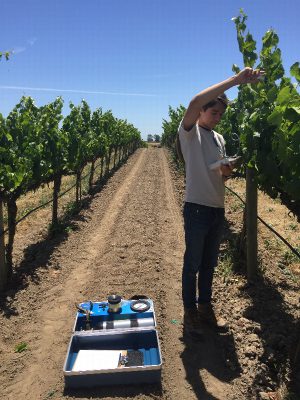
RCD staff can evaluate and improve the precision of your irrigation protocols in the vineyard.
Save Water, Save Money, Maximize Quality
The best irrigation schedule has a triple bottom line: efficient use of water, sensible use of labor and maximum quality of fruit.
- Charles Schembre, Vineyard Conservation Coordinator, Napa County Resource Conservation District
Efficient, targeted irrigation benefits both your bottom line and the quality of your fruit, ensuring vines get the right amount of water at the right time. Here are the benefits of irrigation efficiency:
- Maximize grape quality
- Optimize grape yields
- Minimize operational costs and improve labor efficiency
- Reduce disease risks to your crop
The Napa County Resource Conservation District (RCD) received grant funding to assist growers with low- to no-cost services that improve vineyard irrigation efficiency and scheduling. These include a comprehensive “Irrigation Toolbox” and the “Mobile Irrigation Lab” (a core component of the Toolbox).
The Irrigation Toolbox
This is for growers who want to upgrade their overall irrigation system. We’re seeking vineyards with irrigation issues and growers who want assistance with scheduling and haven’t yet pursued precision irrigation. This could be soil analysis, implementing both mainstream and cutting-edge technologies and/or addressing water quality issues.
The Mobile Irrigation Lab
Any grower can request the Mobile Irrigation Lab. The Lab provides rapid evaluation of irrigation efficiency and uniformity throughout the vineyard. It identifies ways to improve water use and irrigation system performance, which improves vine health. The evaluations focus on Distribution Uniformity (DU) – how evenly the irrigation system is delivering water throughout the vineyard block.
The assessments require the grower to run a normal irrigation set on a standard irrigation area where the grower has some concern or wants to gain additional information for that vineyard. Each grower will commit to participating in the evaluation (2-4 hours), which is considered the “cost share” component.
The grower always gets something out of the evaluation. DU evaluations often aren’t on the top of the vineyard manager’s to do list, and can be overlooked. But if the DU rating is low, the field isn’t being irrigated uniformly, usually due to low-pressure or clogged emitters. We often identify quick adjustments like filter cleaning or injecting a drip cleaner a few times a year to break down and dissolve blockages.
Working closely with the Napa RCD and developing custom drip uniformity protocols has enabled Renteria Vineyard Management to accurately and efficiently irrigate specifically designed precision farming zones with confidence. With these capabilities, we’ve increased yields and quality.
- Rob Whyte, Director of Operations, Renteria Vineyard Management
Read the Series:
1
Save Water, Save Money, Maximize Quality | Efficient, targeted irrigation benefits the bottom line and fruit quality, ensuring vines get the right amount of water at the right time.
2
Reaping the Benefits of Cutting-Edge Irrigation Technologies | Two companies offer precision irrigation technologies to Napa Valley vineyard managers.
Napa Green is about producing wine responsibly and being proud of our respect for the environment and for future generations.
- Elizabeth Vianna, Chimney Rock Winery
